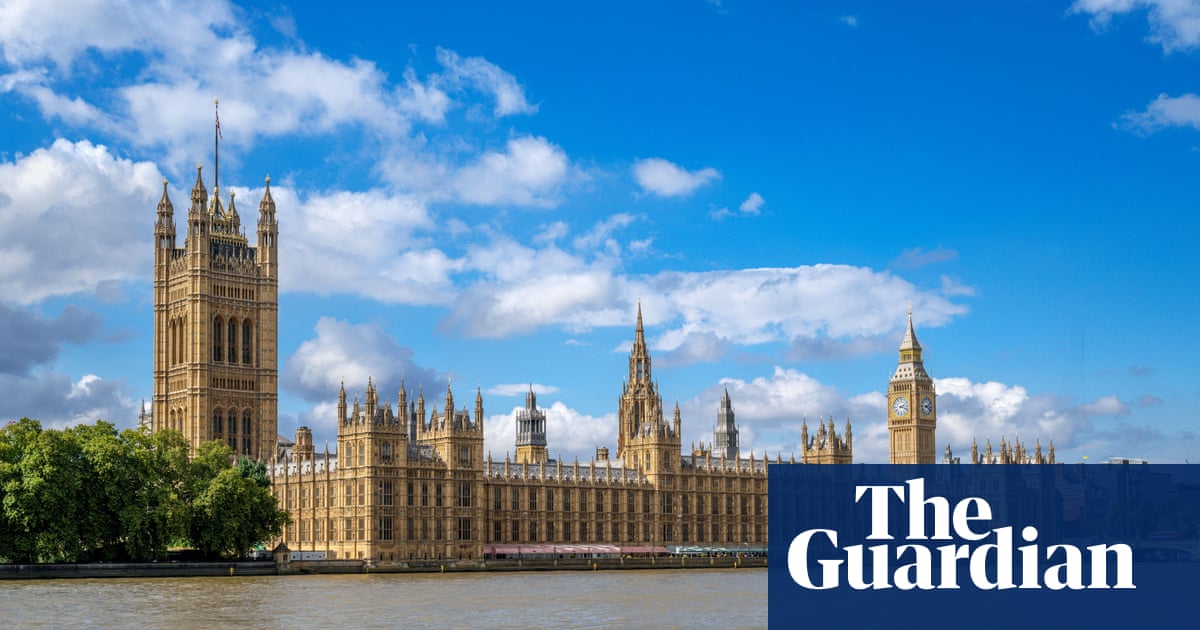
Keir Starmer is to deliver a speech on AI on Monday morning. Photograph: Paul Grover/Reuters
Show key events only Please turn on JavaScript to use this feature
Live feed
Starmer claims AI could led to ‘golden age of public service reform’, even making services ‘feel more human’
Good morning. Today the government wants to talk about AI (artificial intelligence). It is due to publish its AI opportunities action plan this morning, Keir Starmer is giving a speech on the topic, and Peter Kyle, the science secretary, is giving a statement to MPs later. The main elements have already been well trailed. Here is the Department for Science’s overnight news release, and here is a story by Robert Booth summing it all up.
As usual, though, what the government wants to talk about and what it will end up being forced to talk about are not the same. The macro story that matters most in UK politics at the moment is the rise in UK government borrowing costs (largely driven by global economic developments, and the prospect of what Donald Trump will do when he becomes US president next week), and whether this will lead to fresh spending cuts in the spring. On the business live blog, Julia Kollewe says UK bond yields (borrowing costs) are marginally up again this morning.
The two stories are, of course, related. Rishi Sunak was also very interested in AI when he was PM and only 14 months ago he chaired a big, international summit on AI. The contrast is striking. Sunak was predominantly focused on the threat posed by AI, which is why it was an “AI safety” summit and, as it wound up, Labour issued a statement criticising him for not committing to swift “binding regulation” to impose safeguards on tech companies developing AI. Now Labour is in power, it is desperate to generate growth, and the announcement today is totally focused on what AI can do for the economy and public services. “Safety” does not seem to get a mention.
(The 2023 AI summit also culminated with Sunak engaging in a slighty fawning Q&A with Elon Musk. That won’t be happening again, obviously. The world’s richest man has now flipped from being willing to humour the person leading the UK government to trying actively bring to bring him down.)
In an analysis, Dan Milmo explains why Starmer now sees AI as central to his growth strategy.
Milmo says: “Low productivity has bedevilled the UK for years, partly due to low investment in nifty technology. AI, it is hoped, will help British workers produce more, which should raise wages and allow spare capital – you don’t need so many workers to do a certain job – to be invested elsewhere. This is even more important if, with an ageing population, the UK must cope with fewer working-age adults in the future.”
Starmer is giving his speech later this morning, but he has already pubished an article in the Financial Times which is bound to give a flavour of what he will be saying, and in it he says AI could “usher in a golden age of public service reform”.
The global race for AI leadership is fast and getting faster. Some countries are going to make AI breakthroughs and export them to the world. Others will be left to buy those breakthroughs and import them. I don’t believe government should be passive or neutral on this – this is the bread and butter of industrial policy. AI is the greatest force for change in the world right now. I am determined to harness it to usher in a golden age of public service reform. And I am determined the UK will become the best place to start and scale an AI business. I know growth in this area cannot be state-led. But it is absolutely the job of government to make sure the right conditions are in place.
He also argues, counterintuitively, that AI could lead to public services becoming more human.
[AI] offers credible hope of a long-desired boost in public sector productivity. Nurses, social workers, teachers, police officers — for millions of frontline workers, AI can give the precious gift of time. This means they can refocus on the care and connection aspects of their job that so often get buried beneath the bureaucracy. That’s the wonderful irony of AI in the public sector. It provides an opportunity to make services feel more human.
Here is the agenda for the day.
Morning: The government publishes its AI opportunities action plan.
Late morning: Keir Starmer gives a speech on AI.
2.30pm: Yvette Cooper, the home secretary, takes questions in the Commons.
After 3.30pm: Peter Kyle, the science secretary, gives a statement to MPs about the AI plan.
If you want to contact me, please post a message below the line or message me on social media. I can’t read all the messages BTL, but if you put “Andrew” in a message aimed at me, I am more likely to see it because I search for posts containing that word.
If you want to flag something up urgently, it is best to use social media. You can reach me on Bluesky at @andrewsparrowgdn. The Guardian has given up posting from its official accounts on X but individual Guardian journalists are there, I still have my account, and if you message me there at @AndrewSparrow, I will see it and respond if necessary.
I find it very helpful when readers point out mistakes, even minor typos. No error is too small to correct. And I find your questions very interesting too. I can’t promise to reply to them all, but I will try to reply to as many as I can, either BTL or sometimes in the blog.
Key events Show key events only Please turn on JavaScript to use this feature
McFadden rejects suggestions Reeves should be replaced, and says she will still be chancellor in autumn
With growth floundering and the Treasury at risk of having to announce further spending cuts, there has been some talk in the media about whether Rachel Reeves will survive a full term as chancellor. Yesterday the Sunday Times published a long article on this topic by its chief political commentator, Tim Shipman, whose work is viewed as required reading in most Westminster circles. Shipman did not seem to rate her chances very highly. He wrote:
UK gilt prices are rising further and faster than in other comparable economies and many in the City think Reeves’s decisions since July have made the situation worse, not better. “She has lost credibility with the financial markets,” said a former Downing Street aide who now advises leading businessmen. “They don’t think she knows what she’s doing. They don’t believe a word she says. They don’t believe she has any idea how to fix this” ….
In the City, they think [Keir] Starmer wants freedom of manoeuvre if Reeves is unable to salvage the situation. “The markets think Starmer will use her for the March statement and the spending review – all the tough stuff – then bin her,” the former No 10 adviser said. “I think they’re affording Starmer too much political nous, but that’s what he should do.”
Shipman said Wes Streeting, the health secretary, and Yvette Cooper, the home secretary, were both potential replacements, but he described Pat McFadden, the Cabinet Office minister, as the “firm favourite” to be the next chancellor.
In an interview with Times Radio this morning, asked if he thought Reeves would survive as chancellor until the autumn, McFadden replied: “Yes, I do.”
He also rejected suggestions she should be replaced, saying she had the support of Keir Starmer and the whole government.
Rachel Reeves is the chancellor for a good reason, because she’s the right person to do the job.
And one of the things I’d say about those kind of stories is when we won the general election, we won it as a team that was not afflicted by the kind of rivalries and personalities that had sometimes afflicted governments in the past. And we govern as a team and Rachel’s got the support of me, the prime minister and the whole cabinet.
Trying to halt rollout of AI would be like trying to press 'pause button' on history, says Pat McFadden
In an interview with Times Radio, Pat McFadden, the Cabinet Office minister, rejected suggestions that the government should try to halt the rollout of AI because of the potential impact on jobs. That would be like pressing the “pause button” on history, he said.
At what point in history would you have us press the pause button? This is the story of historical and economic change. And we’re on the threshold of another huge one. And the country’s got to seize the opportunities from this.
If we, again, follow the logic of your questioning, just try to press the pause button in previous history, then we’d never have become an industrialised country in the first place.
The Tony Blair Institute, a thinktank led by the former PM, has welcomed the government’s announcement about AI today. Blair himself talks endlessly about the opportunities offered by AI, and he is evangelical about the need for the public sector to embrace them. Alexander Iosad, director of government innovation at the TBI, said:
As the prime minister has made clear, AI is no longer an if, or even a when; it is here, and it is urgent. The opportunities for Britain’s economy and our public services are too great for us to ignore. This has to be the government’s priority.
Public sector workers are overwhelmed and overworked, with many choosing to leave rather than try to make a broken system work. The result is a doom loop of growing backlogs, worsening outcomes and rising failure demand. The real impact of this is felt not just by those workers, but by the British public who can’t get doctors’ appointments, the benefits they are entitled to, and the high-quality education they and their children deserve.
AI can help take care of drudgery in the public sector, freeing people up to focus on high-value tasks that require the human touch. TBI research shows that we can generate up to £40bn a year in productivity gains and savings, all while delivering better, faster and further.
Blair’s thinktank is not always this successful at getting Keir Starmer to adopt its ideas. Three days after the general election, after Blair renewed his call for digital ID cards (another of his pet policy ideas), the government said no.
The Conservative party responded to the government’s AI announcement overnight by saying Labour had no credibility on this issue because “shaping a successful AI future requires investment, but in the six months leading up to this plan, Labour cut £1.3bn in funding for Britain’s first next-generation supercomputer and AI research”.
Pat McFadden, the Cabinet Office minister, has been giving interviews this morning. Asked on the Today programme why Labour abandoned the plan for a supercomputer at Edinburgh University, he replied:
The previous government did this all the time. They announced things with no money set aside for them.
McFadden said the government would be investing in computing, increasing “public computing power by a factor of 20 by 2030”. He went on:
The difference will be that when the Labour government announces this, we will put the funding to it. We’re not engaged in fantasy announcements with no money behind them.
Michael Ellam, a former Treasury official who worked as Gordon Brown’s press secretary when Brown was PM, has been put in charge of the government’s bid to reset relations with the EU.
Ellam left the civil service to take a job with HSBC, but the government has announced that he is rejoining the Cabinet Office as second permanent secretary, European Union and international economic affairs.
In a statement, Nick Thomas-Symonds, the Cabinet Office minister responsible for the reset with Brussels, said:
The prime minister has set out a clear plan for change to improve people’s lives. That includes growing our economy and improving national security. Michael’s experience at the highest levels of international finance will be a huge asset as we work to deliver economic growth on behalf of the British people, including through resetting our relationship with the EU.
In his Financial Times article Keir Starmer also includes an uncharacteristic ‘benefits of Brexit’ line as he explains that the UK does not need to follow either the US or the EU approach to AI regulation. He says:
Britain shouldn’t just be excited about AI – it should be confident. We don’t need to walk down a US or an EU path on AI regulation – we can go our own way, taking a distinctively British approach that will test AI long before we regulate, so that everything we do will be proportionate and grounded in the science. And alongside that, an offer to investors of stability, pragmatism and the good sense they would expect from democratic British values.
Again, this is different from the line Labour was adopting at the time of Rishi Sunak’s AI summit 14 months ago when Peter Kyle complained “the prime minister has been left behind by US and EU who are moving ahead with real safeguards on the technology”.
Starmer claims AI could led to ‘golden age of public service reform’, even making services ‘feel more human’
Good morning. Today the government wants to talk about AI (artificial intelligence). It is due to publish its AI opportunities action plan this morning, Keir Starmer is giving a speech on the topic, and Peter Kyle, the science secretary, is giving a statement to MPs later. The main elements have already been well trailed. Here is the Department for Science’s overnight news release, and here is a story by Robert Booth summing it all up.
As usual, though, what the government wants to talk about and what it will end up being forced to talk about are not the same. The macro story that matters most in UK politics at the moment is the rise in UK government borrowing costs (largely driven by global economic developments, and the prospect of what Donald Trump will do when he becomes US president next week), and whether this will lead to fresh spending cuts in the spring. On the business live blog, Julia Kollewe says UK bond yields (borrowing costs) are marginally up again this morning.
The two stories are, of course, related. Rishi Sunak was also very interested in AI when he was PM and only 14 months ago he chaired a big, international summit on AI. The contrast is striking. Sunak was predominantly focused on the threat posed by AI, which is why it was an “AI safety” summit and, as it wound up, Labour issued a statement criticising him for not committing to swift “binding regulation” to impose safeguards on tech companies developing AI. Now Labour is in power, it is desperate to generate growth, and the announcement today is totally focused on what AI can do for the economy and public services. “Safety” does not seem to get a mention.
(The 2023 AI summit also culminated with Sunak engaging in a slighty fawning Q&A with Elon Musk. That won’t be happening again, obviously. The world’s richest man has now flipped from being willing to humour the person leading the UK government to trying actively bring to bring him down.)
In an analysis, Dan Milmo explains why Starmer now sees AI as central to his growth strategy.
Milmo says: “Low productivity has bedevilled the UK for years, partly due to low investment in nifty technology. AI, it is hoped, will help British workers produce more, which should raise wages and allow spare capital – you don’t need so many workers to do a certain job – to be invested elsewhere. This is even more important if, with an ageing population, the UK must cope with fewer working-age adults in the future.”
Starmer is giving his speech later this morning, but he has already pubished an article in the Financial Times which is bound to give a flavour of what he will be saying, and in it he says AI could “usher in a golden age of public service reform”.
The global race for AI leadership is fast and getting faster. Some countries are going to make AI breakthroughs and export them to the world. Others will be left to buy those breakthroughs and import them. I don’t believe government should be passive or neutral on this – this is the bread and butter of industrial policy. AI is the greatest force for change in the world right now. I am determined to harness it to usher in a golden age of public service reform. And I am determined the UK will become the best place to start and scale an AI business. I know growth in this area cannot be state-led. But it is absolutely the job of government to make sure the right conditions are in place.
He also argues, counterintuitively, that AI could lead to public services becoming more human.
[AI] offers credible hope of a long-desired boost in public sector productivity. Nurses, social workers, teachers, police officers — for millions of frontline workers, AI can give the precious gift of time. This means they can refocus on the care and connection aspects of their job that so often get buried beneath the bureaucracy. That’s the wonderful irony of AI in the public sector. It provides an opportunity to make services feel more human.
Here is the agenda for the day.
Morning: The government publishes its AI opportunities action plan.
Late morning: Keir Starmer gives a speech on AI.
2.30pm: Yvette Cooper, the home secretary, takes questions in the Commons.
After 3.30pm: Peter Kyle, the science secretary, gives a statement to MPs about the AI plan.
If you want to contact me, please post a message below the line or message me on social media. I can’t read all the messages BTL, but if you put “Andrew” in a message aimed at me, I am more likely to see it because I search for posts containing that word.
If you want to flag something up urgently, it is best to use social media. You can reach me on Bluesky at @andrewsparrowgdn. The Guardian has given up posting from its official accounts on X but individual Guardian journalists are there, I still have my account, and if you message me there at @AndrewSparrow, I will see it and respond if necessary.
I find it very helpful when readers point out mistakes, even minor typos. No error is too small to correct. And I find your questions very interesting too. I can’t promise to reply to them all, but I will try to reply to as many as I can, either BTL or sometimes in the blog.
Explore more on these topics

.png) 3 months ago
32
3 months ago
32













































